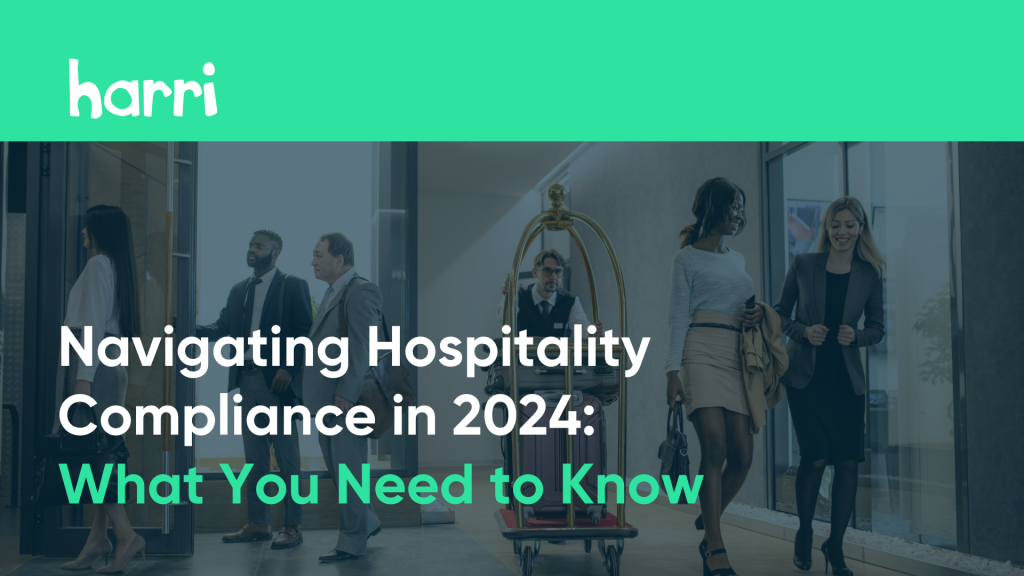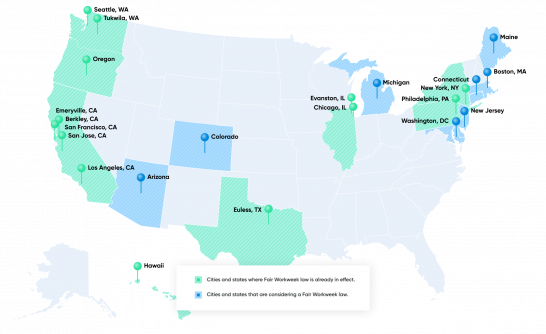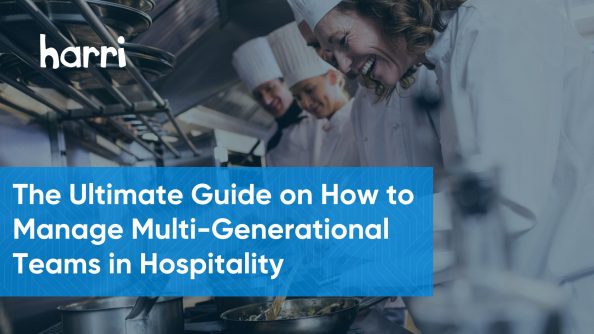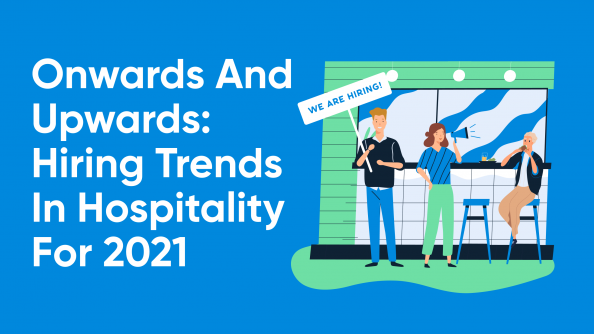Navigating Hospitality Compliance in 2024: What You Need to Know

- By Harri Insider Team | January 9, 2024
Workforce compliance rules and laws change as time progresses. From updates to minimum wage ordinances in 2024 across states and jurisdictions to Fair Workweek legislation and beyond, there is plenty for business owners to keep track of.
Harri is here to help hospitality businesses like yours monitor changes in compliance and adhere to those new rules. Take full advantage of the Harri platform and you’ll be better equipped to remain one step ahead of compliance regulations, facilitating smooth operations and sidestepping penalties.
Let’s take a look at some of the most notable workforce compliance challenges along with their respective solutions heading into 2024.

The Evolving Landscape of Hospitality Compliance in 2024
Business owners and managers who make a concerted effort to remain up-to-date with the changes will avoid financial penalties and also ensure their employees are treated with care. Every restaurant, hotel and other hospitality business head should be aware that labor shortages are no excuse to ignore labor laws.
As highlighted by the Washington Post, labor shortages are likely to continue impacting the industry with two million hotel, restaurant and leisure positions remaining open throughout the year ahead. Labor shortages certainly present challenges yet those shortages aren’t a justifiable reason to ignore labor laws and best practices.
Understanding Workforce Compliance and Its Impact
Workforce compliance is a term used by attorneys and judges to encapsulate the rules passed into law to protect hardworking hospitality industry employees. Follow the rules of the workplace and you’ll be in the best position to boost employee retention while avoiding costly consequences for non-compliance.
State-by-State Variations in Compliance Laws
Workforce compliance laws differ by state. As is often said, the United States is more of a combination of 50 unique countries than a unified whole. The differences between the states are exemplified in their idiosyncratic laws including rules that govern hospitality industry workplaces.
Take a close look at the workplace compliance laws throughout the country and you’ll find there are differences. The specific policies and laws relevant to your business in one state have the potential to be completely different in one or several other states.
This informative guide is a good place to start learning about new and updated state laws that govern employees at hotels, restaurants and leisure businesses. Be sure to always confirm with official government documentation and legal counsel to ensure you understand and are complying with any updated policies across any jurisdiction you may operate within.
Key Compliance Areas for 2024: Fair Workweek and Predictive Scheduling Laws
The Fair Workweek practices and predictive scheduling laws shape how hospitality industry employees work, as many employees within the field are scheduled on an hourly basis. Stick to the nuanced rules of these laws and your business should be able to engage employees, retain their labor and also sidestep harsh fines and other penalties.
Navigating Fair Workweek Practices
Fair Workweek laws are on the books to protect employees. These policies, present across many local jurisdictions and a few states, mandate that employers provide workers with predictable work schedules.
The point of these unique laws is to ensure employees who work in the hospitality industry are provided with sufficient notice regarding upcoming shift schedules. Otherwise, your workforce could be left hanging due to the industry’s inherently unpredictable scheduling.
Adapting to Predictive Scheduling Laws
The purpose of predictive scheduling laws is to provide hospitality industry workers with sufficient notice of their upcoming schedule. The laws typically mandate employers provide schedules a minimum of two calendar weeks ahead of time. Schedules are to be presented in an area accessed by all employees for optimal visibility.
Most predictive scheduling laws encompass on-call shifts, meaning those who are available to work when others call in sick or cannot work for another reason. Additionally, most predictive scheduling laws also require financial payment to employees as a form of negative reinforcement for a shift change without sufficient notice.
The distinct type of violation dictates the amount of the fine paid. Furthermore, most predictive scheduling laws also permit employees to refuse shifts if those shifts were not originally included on the written schedule.
A well-planned schedule not only stays ahead of Fair Workweek regulations but also helps to ensure operational success. Using intelligent scheduling software like Harri can help you to proactively manage your compliance efforts and generate optimal labor mixes for each of your locations.

Addressing Minimum Wage Adjustments and Scheduling Minors
The minimum wage is changing in several states in 2024. Moreover, business owners and managers should also be aware of the rules that govern the scheduling and employment of minors.
Understanding Minimum Wage Changes in 2024
Come 2024, the minimum wage is set to change across at least 22 states and 40 cities in the U.S.
New York, New Jersey, Maryland and the District of Columbia will have statewide minimum wages of $15 or higher in 2024. Washington state has the highest statewide minimum wage at $16.28, while California is hiking its minimum wage from $15.50 to $16.
The minimum wage will also increase in Florida in September and Nevada and Oregon in July. Moreover, some cities will increase their minimum wage to historic peak highs. For example, Tukwila, Washington, will hike its minimum wage to $20.29 in January.
Additionally, some jurisdictions are also hiking the minimum all-cash hourly wage for employees considered to be “tipped”, meaning they are eligible for tips from their guests. As an example, Hawaii employers will be empowered to take a $1.25 per hour tip credit in the year ahead assuming the combined sum of worker direct cash wages plus tips is a minimum of $7 more per hour than the state’s minimum wage. Therefore, Hawaii employers can only claim the 2024 tip credit if employees receive tips and direct cash wages that result in an average hourly sum of $21 per hour.
As the minimum wage rises and labor costs increase, employers will look to HCM platforms that consolidate essential employee and business information. By uniting payroll details with labor projections and intelligent scheduling in a single platform, businesses can gain the ability to spot operational inefficiencies and specific trends. This integrated approach enables them to make informed financial decisions based on comprehensive data analysis.
Best Practices for Scheduling Minors
Let’s shift our attention to the scheduling of minors in hospitality industry jobs in 2024. There are specific regulations including best practices governing the scheduling of minors. Recognize that hiring minors may be a competitive advantage, adhere to the ethical framework detailed below and the arrangement should prove mutually beneficial.
The Fair Labor Standards Act, or FLSA for short, states businesses employing minors must honor scheduling restrictions. Such restrictions determine when minors can and can’t work including the maximum number of daily and weekly hours minors are allowed to work. Moreover, each state has distinct rules about the maximum number of hours minors are allowed to work and when those hours may be worked. Harri is here to help your business remain fully compliant with your state’s laws governing the employment of minors. Our compliance management system helps hotels, restaurants and other businesses abide by the rules of minor labor requirements for full compliance. Harri pieces together the puzzle of workforce logistics, employee availability and more in real-time. This strategic approach monitors schedules for restrictions that optimize labor, assisting you with relevant workforce compliance regulations.
Harri’s Compliance Tools: Simplifying Adherence and Focus on Guest Satisfaction
Harri’s compliance tools help hospitality business owners and managers simplify and automate efforts to comply with changing compliance regulations.
The Role of Technology in Compliance Management
Compliance management is that much easier with the right technology. Harri’s all-in-one workforce compliance system decreases risk and preserves your most important asset: time. Try our platform at your business and you’ll feel as though a large weight has been lifted off your shoulders. Compliance through Harri helps minimize the risks of potential non-compliance through automation.
The Harri platform provides your hardworking team with pre-configured compliance builds for optimal scheduling that assists you and your team in complying with local and federal labor laws. We make it easier to generate fully legal schedules in response to historic demand and labor limitations. Our system can audit compliance breaches in seconds and also streamlines onboarding through a web-based portal. These features can integrate your onboarding efforts with labor laws in your jurisdiction.
Our compliance management system can ultimately reduce the labor burden and mental toll on hospitality business owners, managers and human resources personnel.
Case Studies: Harri’s Impact on Compliance Efficiency
With Harri, the proof is in the details: just ask any of our industry-leading clients across the United States.
One of our Chicago-based companies uses the Harri platform to remain fully compliant with the detailed regulations of the Fair Workweek ordinance, employing an integrated approach to compliance. The company, a Jersey Mike’s franchise, took full advantage of Harri’s real-time management allowing for good faith documentation. The business owner commented, “I can’t even quantify or imagine all of the soft costs it would have required to successfully keep track of something like Fair Workweek without having a system like Harri.”
Gregorys Coffee is another example of the Harri platform’s impact on employee management, engagement, retention and compliance. The rapidly growing coffee roaster used the Harri platform to expand to more than 35 locations while remaining fully compliant with labor laws.
Gregorys Coffee managers use the Harri platform to connect with potential hires, schedule interviews and onboard those additions while remaining 100% compliant with Fair Workweek requirements.
Conclusion: Staying Ahead in the Compliance Game
If you don’t have your finger on the pulse of labor laws, don’t feel guilty. You are likely wearing many metaphorical workplace “hats”, attempting to simultaneously hire new team members, advertise and manage operations. The time has come to tap into one of the industry’s leading tech platforms, helping hospitality businesses remain fully compliant with labor regulations.
We invite you to try the Harri Demo to better understand how our technology can help your business remain fully compliant with labor laws and retain your hardworking employees for optimal workplace efficiency.





















